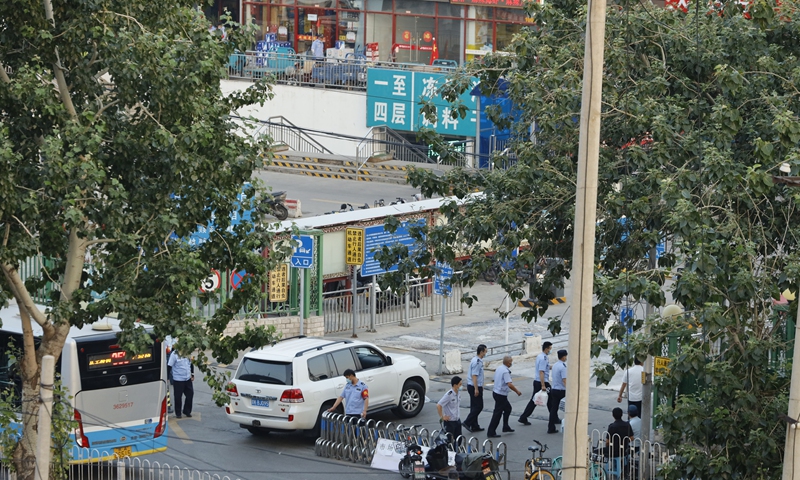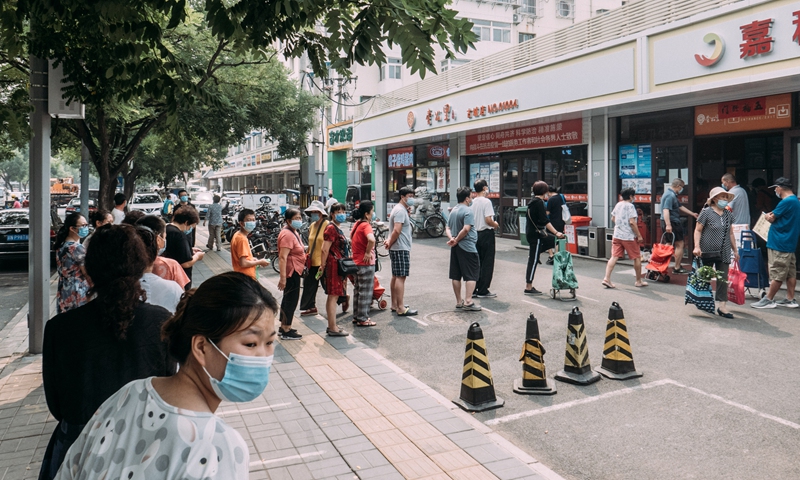Beijing enters special period against COVID-19
By Liu Caiyu Source:Global Times Published: 2020/6/13 23:15:51 Last Updated: 2020/6/14 18:03:37
Public health experts assure it won’t cause second wave, but serve as warning to alter anti-epidemic policies

Photo:Li Hao/GT
Beijing enters a new special period in combating COVID-19, top officials in the capital said on Saturday after confirmed cases were reported and nucleic acid test results came back positive, urging to decisively curb the spread of the deadly disease.
"We must ponder our pains, draw lessons from it, and always tighten the string of epidemic prevention and control," according to an anti-epidemic meeting chaired by Beijing Party Secretary Cai Qi on Saturday.
The National Health Commission sent an expert team to guide Beijing's prevention and control work. They will strengthen the analysis and judgment of the overall epidemic situation and create targeted measures to curb the virus from spreading.
Public health experts assure Beijing's regionally clustered COVID-19 infections won't cause a second wave of the epidemic in China, but act as a warning to alter the nation's anti-epidemic policies.
The epidemic in Beijing, being the capital, strings hearts and confidence of the whole nation in fighting against COVID-19, but Wang Peiyu, deputy head of Peking University's School of Public Health, believes the clustered infections in the capital will be curbed soon and won't cause a second wave of COVID-19.
Wang told the Global Times on Saturday that the consecutive reports of confirmed cases indeed triggered widespread panic in Beijing, where it has been implementing one of the most-strict anti-epidemic measures in the entire country.
"Whether China can prevent domestic cases from further rebounding depends on how quick and well Beijing curbs COVID-19," Wang said.

Photo:Li Hao/GT
As a severe pandemic, it is normal to see a rebound of the epidemic after it's basically controlled. Outbreak rebounds were also seen in countries like Japan and South Korea recently, the public health expert said.
Beijing has found confirmed cases and positive infections via nucleic acid testing for two consecutive days, all of which are associated with the Xinfadi Market in Fengtai district, one of the six districts in Beijing, located in the southern part of the city.
To curb the viral spread, Beijing shut down the wholesale market and imposed closed-loop management for nearby neighborhoods. COVID-19 tests will be carried out in all Xinfadi-related neighborhoods and restaurants, if an emergency arises, officials are urged to act "decisively."
The recent confirmed cases and COVID-19 test results in Beijing taught us a lesson that we should adjust anti-epidemic policies, Wang told the Global Times.
Previously China's anti-epidemic policies gave priority to "human beings" either people from overseas, epidemic-stricken cities in other parts of China or close contacts of confirmed cases, but the case in Beijing tells us that "objects" should also be carefully monitored and be included within anti-epidemic policy, Wang explained.
Objects like food, things or the environment that people easily have contact with, deliveries and packages, Wang noted.
The novel coronavirus was detected on chopping boards used by a seller of imported salmon at Xinfadi market and 40 environmental samples collected from the market also tested positive for COVID-19.
To better coordinate the anti-epidemic work in the capital, Beijing authorities have dispatched a special working group to Fengtai district, which has activated a "wartime" status in the wake of the emergence of new COVID-19 cases that were all related to the market, the largest wholesale vegetable market in the capital.
Officials in Beijing were urged to do a good job in tracing the epidemiological investigation, expand the scope of medical observation regarding relevant personnel, nucleic acid tests, and the scope of sample collections.
All merchants working in the Xinfadi Market and local residents in nearby communities are required to undergo nucleic acid tests. People in the capital who had been to the market since May 30 also have to report to local communities and receive COVID-19 tests.
Beyond the above measures, Beijing said comprehensive environmental elimination and sanitation remediation will be carried out at the Xinfadi market.
Posted in: SOCIETY,FOCUS